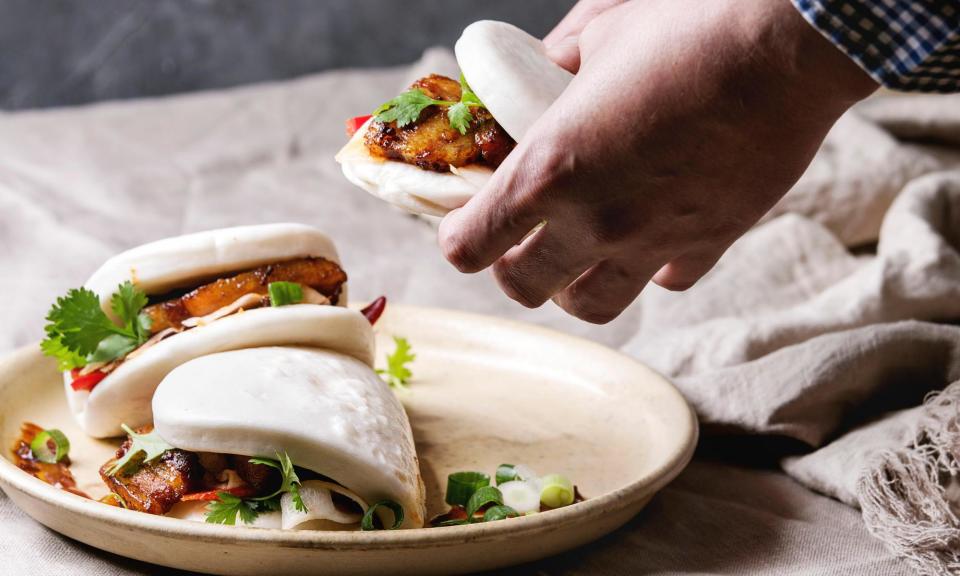Sales of bao buns on a roll as Britons fall in love with Asian treat

The origin of bao buns, or baozi, goes back as far as third-century China. The legend goes that a military strategist used the wheat buns instead of human heads as a peace offering to a god for safe passage. The deity fell in love with the steamed buns so much that he parted the rough waters of the river to allow crossing.
It seems Britons have also fallen for the Asian treat. The English Breakfast Society, devoted to promoting the traditional English breakfast, this month encouraged the introduction of bao buns as part of a morning fry-up.
A range of restaurants including the Wetherspoon’s pub chain, have experimented with them on their menus. Brunches and traditional burger places are swapping out bread for bao. Supermarkets are also reporting a huge boost in sales, and experts say the trend is driven by increasing interest in world cuisine.
The fluffy white buns have experienced year-on-year growth, driven by a “shift towards embracing diverse cuisines”, according to Trish Caddy, associate director of food service at analysts Mintel.
“This trend began as early as November 2013, with growing consumer interest in ethnic street food. Bao buns are a prime example. Back then, 14% of restaurant consumers had already tried baozi or bao. This trend continues to grow, with new takes on bao-like bao bun burgers emerging, highlighting a consumer appetite for more adventurous options beyond the familiar.”
Caddy said that in May 2022, 21% of fast food consumers expressed interest in alternatives to standard burger buns, with steamed bao buns being one of the main options. “This interest continues to gain traction, with 44% of burger consumers indicating in June 2023 that they would be likely to order bao bun burgers,” she said.
Tesco now sells 10 different varieties of branded and own-label bao buns including frozen, savoury and sweet versions. Marks & Spencer sells about 475,000 bao buns a year and said its Panda bun sales were up 25% so far this year compared with last.
Sainsbury’s first launched bao buns in 2017 to its “on the go” range, which was the first of its kind for a UK supermarket. Barbara Ross, the product development manager at the supermarket chain, said: “Bao buns have proven popular with Sainsbury’s customers, so much so that we included them in our recent party food range for Christmas in 2023. We even sold out before Christmas Eve.”
Ocado said sales of bao buns had increased 45.15% year on year between May 2022 to April 2023 and May 2023 to 2024. Searches for the product on its website rose by 13.72% year on year in the same time period. In 2024, it increased its range by 50%.
Allison Burdett, trading manager at Waitrose, said: “Our steamed buns have been a hit ever since we launched them last year … and with searches on Waitrose.com up 180% in the last week alone we know that they remain a firm favourite.”
Aldi first stocked bao buns in 2023 as a limited range over the summer. Due to their popularity, the supermarket launched mini bao buns as part of its Christmas party food range and they are now sold all year round with volumes quadrupling. Aldi has plans to launch a range of new bao buns later this year.
Its managing director of buying, Julie Ashfield, said: “World foods are becoming more popular. What used to be a fairly narrow selection of cuisines, like curries and noodles, has expanded … The cost of living crisis has also seen people eating out less often, but they still want to experiment with food at home.”
Wetherspoon’s trialled them on some of its menus in February, although they are no longer available. The pub chain introduced bao buns as part of its affordable Small Plates range, described as “traditional Asian steamed buns with spicy crunchy chicken”, but the Daily Mail reported that it was criticised online for its “depressing portions”, including one slice of onion.
Steve Mangleshot, global executive chef at the restaurant giant Wagamama, said it had served bao buns for a decade, with increased growth in the past five years. “The volume of buns sold each month has increased by 133%. The thing we love about bao is they’re the perfect blank canvas for bold flavour and texture.”
All this combined, Caddy said, meant that restaurants and supermarkets were catering to the growing demand for accessible street food. She added: “Bao buns are well on track to becoming a mainstream menu item in the UK.”

 Yahoo Finance
Yahoo Finance 